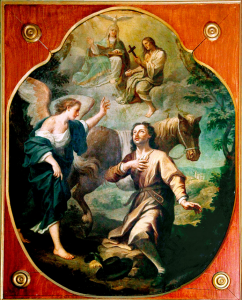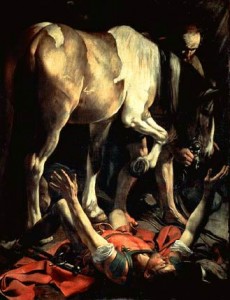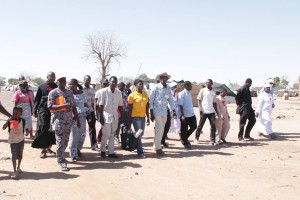1575 – 2 February – 2015
The Four Hundred and Fortieth Anniversary of the Conversion of St. Camillus de Lellis
 ‘Camillus continued for some time with that way of life being he at that time so far from God that he no longer remembered his vow nor any good resolution. Indeed, he was so alien to these thoughts that being badly dressed and suffering from great cold in that winter, and given that those fathers had given him our of compassion some of that rough material that they wear for him to make clothes of it, he out of fear that they did so as to gradually induce him to be a friar never wanted to accept it…
‘Camillus continued for some time with that way of life being he at that time so far from God that he no longer remembered his vow nor any good resolution. Indeed, he was so alien to these thoughts that being badly dressed and suffering from great cold in that winter, and given that those fathers had given him our of compassion some of that rough material that they wear for him to make clothes of it, he out of fear that they did so as to gradually induce him to be a friar never wanted to accept it…
In the evening while he was preparing for the journey the guardian of that friary whose name was Friar Angelo (who in truth was a good angel for him) called him under an arbour of vines and because by his actions he seemed to him to be a young man given over to the things of this world he made a brief spiritual talk to him, giving him in particular some observations against bad temptations…After this talk was over, Camillus made no reply except: Father pray to God for me, so that He may illuminate me as to what I should do for His service and for the health of my soul. And with this conclusion the next morning having heard his Mass (and perhaps taken the blessed candle given that the day was the Purification of the Most Holy Virgin) he left and went towards Manfredonia. On the way riding a donkey between two flasks of wine that were inside a pair of saddle bags he went on his way thinking of the things that had been said to him by the Father Guardian. While he was thus proceeding in thought, like another St. Paul he was suddenly assailed from heaven by a ray of interior light which was so great for his miserable state that to his great contrition he seemed to have his heart in pieces, and torn by pain, he was not able because of the unusual commotion to keep on riding; as though knocked down by a divine light he allowed himself to fall to the ground in the middle of the road. There kneeling on a stone he began to feel unusual pain and tears fell from his eyes as we bitterly wept for his past life. He said with words interrupted by sobs: O miserable and unhappy me what great blindness mine has been that I did not know before my Lord? Why have I not spent all of my life serving Him? Forgive me Lord, forgive this great sinner. Give me at least space for true penitence, and to be able to take so much water from my eyes as to wash away the stains and ugliness of my sins. Saying these and similar things he was never sated in shaking himself and beating himself on his chest, not having the force to raise his eyes to heaven so great was his shame and confusion to look at it. In that weeping and still on his knees (after rendering infinite thanks to the goodness of God who with so great patience had waited for him hitherto) he made a very great resolution to never offend Him again, to engage in harsh penitence and above all to become a Capuchin as soon as possible. Saying and repeating a number of times the following words: no more world, no more world. From that day onwards which was in February 1575, a holy year and the third year of the pontificate of Gregory XIII, most solemn memorial of the Purification of the always immaculate Virgin, the twenty-fifth year of his life, until the end of his life he never remembered nor accused his conscience, by the grace of God, committing a mortal sin known to him nor any voluntary venial sin…’
Fr. Sanzio Cicatelli, Vita del p. Camillo de Lellis, Cap. X – Camillo vien chiamato da Dio al suo vero conoscimento
What better way of speaking about the unfathomable mystery of the conversion of the heart of the man Camillus is there than borrowing the words and emotion of another man, one amongst many, whom the grace of God took from the abyss, maltreated in the well of mercy and threw back into the lists of history in order to make it become History with a capital ‘S’?
‘After entering at 5.10 a chapel in the Latin quarter of Paris, looking for a friend, I left at 5.15 in the company of a friendship which was not of this earth. I had gone in sceptical and an atheist…more than sceptical and more than an atheist, I was indifferent and concerned with other things than a God whom I no longer thought even of denying…Standing beside the door, I looked for my friend with my eyes, but I could not see him…My gaze went from the shadows to the  light…from the faithful to the women religious, to the altar…It stopped on the second candle that was burning to the left of the Cross (I did not know that I was in front of the Most Holy Sacrament). And then suddenly a series of wonders took place whose inexorable violence dismantled in a moment that absurd being that I was in order to give birth to the amazed boy that I had never been…To begin with these words were suggested to me ‘Spiritual Life’…as though they had been uttered beside me in a low voice…then a great light…a world, another world of a splendour and a density that suddenly sends our world to the frail shadows of unfulfilled dreams…the evidence of God…all of whose sweetness I felt…am active sweetness, overwhelming, beyond all violence, able to break the hardest stone and, even harder than stone, the human heart. His overflowing and total irruption was accompanied by a joy that was the exultance of the saved man, the joy of a shipwrecked man saved in time. These feelings, which I find difficult to translate in an inadequate language as regards ideas and images, were simultaneous…Everything was dominated by the presence… of He whose name I will never be able to write without being afraid of wounding His tenderness, He in front of whom I have the good fortune to be a forgiven son who awoke to learn that everything is gift. God existed and was present, revealed, masked at one time by that delegation of light which without talk or figures gave everything to understanding and love…One thing alone surprised me: the Eucharist; not that it seemed to me incredible but I was amazed that divine charity had found this unprecedented method to communicate itself, and above all that it had chosen bread to do this which is the food of the poor and the favourite food of the young. Love, to speak about you, eternity will be too short’ Dio esiste: io l’ho incontrato Conversione (‘God Exists: I Met Him Conversion’) by Andrè Frossard
light…from the faithful to the women religious, to the altar…It stopped on the second candle that was burning to the left of the Cross (I did not know that I was in front of the Most Holy Sacrament). And then suddenly a series of wonders took place whose inexorable violence dismantled in a moment that absurd being that I was in order to give birth to the amazed boy that I had never been…To begin with these words were suggested to me ‘Spiritual Life’…as though they had been uttered beside me in a low voice…then a great light…a world, another world of a splendour and a density that suddenly sends our world to the frail shadows of unfulfilled dreams…the evidence of God…all of whose sweetness I felt…am active sweetness, overwhelming, beyond all violence, able to break the hardest stone and, even harder than stone, the human heart. His overflowing and total irruption was accompanied by a joy that was the exultance of the saved man, the joy of a shipwrecked man saved in time. These feelings, which I find difficult to translate in an inadequate language as regards ideas and images, were simultaneous…Everything was dominated by the presence… of He whose name I will never be able to write without being afraid of wounding His tenderness, He in front of whom I have the good fortune to be a forgiven son who awoke to learn that everything is gift. God existed and was present, revealed, masked at one time by that delegation of light which without talk or figures gave everything to understanding and love…One thing alone surprised me: the Eucharist; not that it seemed to me incredible but I was amazed that divine charity had found this unprecedented method to communicate itself, and above all that it had chosen bread to do this which is the food of the poor and the favourite food of the young. Love, to speak about you, eternity will be too short’ Dio esiste: io l’ho incontrato Conversione (‘God Exists: I Met Him Conversion’) by Andrè Frossard
The overwhelming mystical experience of conversion profoundly transformed Camillus de Lellis. He was a convert. The first Camillian community, which on very many occasions listened to the Father talking about his strong experience of his, perceived with great clarity that this new community of service for the sick had to be made up of men totally renewed by grace, that is to say converts, in order to be able to go on that journey of charity together with Father Camillus.
A Camillian of any epoch is suited to serving the sick in the spirit of the Gospel and the teachings of Camillus only if he has first actuated in himself the profoundly paschal imperative of resurrection. ‘Repent then, and turn to God, so that he will forgive your sins. If you do, times of spiritual strength will come from the Lord’ (Acts 3:18).
Camillus, strong because of his experience, wanted this fundamental principle of Christian life and apostolic life to be codified in the Formula of Life and in the Constitution. In the Formula of Life we read: ‘Any person who has decided to give himself perpetually to this work of charity, should think that he is dead to this world, and all the things of it, and live only for Christ’.
 We can summarise who Camillus the new man, unleashed by the grace of conversion and sent out decisively in the footsteps of Christ, really was. From that moment onwards, the Christian commitment of Camillus moved along certain coordinates which the light of the Spirit made him learn about and which would guide him for the whole of his life. We can list them in the following way:
We can summarise who Camillus the new man, unleashed by the grace of conversion and sent out decisively in the footsteps of Christ, really was. From that moment onwards, the Christian commitment of Camillus moved along certain coordinates which the light of the Spirit made him learn about and which would guide him for the whole of his life. We can list them in the following way:
- ‘No more world, no more world’: for many years Camillus had lived with constant compromises before God and the requirements of the Gospel. Now in the light of grace he understood that the only value that was worth living for, working for and hoping for, was God Himself. Now, stretched out on that stone sticking out of that harsh path, Camillus perceived the complete emptiness of his life which the world, in which he had been immersed in order to inebriate his boiling youthful years, had dug for him. Consequently, his first pledge to God was to break in a clear and irreversible way with the world.
- ‘He made a very great resolution to never offend Him again’: at this moment of grace he allowed himself to be ‘won over by Christ’ (Eph 3:12), totally and radically. On his deathbed, fixing his eyes on his beloved Crucified Christ (which has been commissioned by him ‘with a great deal of blood’, a sign of the great mercy that God had demonstrated towards him), he could humbly state to his sons that from that day of grace onwards he had never deliberately again offended the Lord.
- ‘Under the gaze and the protection of Mary’: Mary, on the day of the Purification, took him under her protective cloak and guided his first steps, and it was always she who accompanied him during the most important moments of his life. On the day of his conversion Mary took Camillus by the hand and led him to the feet of the Crucified Christ. From that day onwards, the Crucified Christ was for him the guide of his life, the inspirer of his exemplary mission of charity, the comfort of the last moments of his life on earth and the prize of his faithfulness to the grace that had enveloped him and transformed him on that far off day of his conversion.














Camillians on Facebook
Camillians on Twitter
Camillians on Instagram